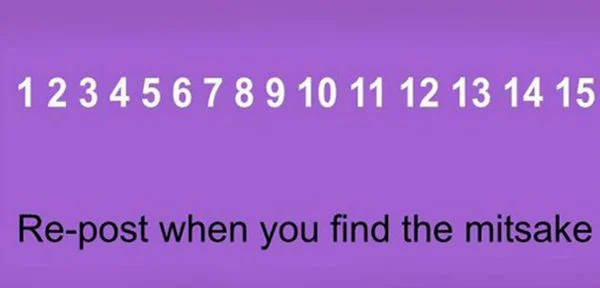Puzzles have always fascinated people, and it’s easy to see why. They come in many forms, from simple ones to those that are incredibly challenging. Some puzzles even remain unsolved, adding to the allure for anyone who enjoys a good mental workout.

However, puzzles are not just for enthusiasts. They offer remarkable benefits to everyone, no matter your interest level. Solving puzzles is essentially a workout for your brain, keeping it sharp and agile. It encourages thinking differently and creatively to uncover solutions.
The Puzzle that Stumped the Internet
There’s a particular puzzle that has baffled the internet, leaving many puzzled. At first glance, it appears to be just an ordinary picture of numbers arranged from 1 to 15. The challenge is to find the error and share the image. Seems simple, right?

But as you inspect the image, you notice something odd. The numbers are perfect, with none missing or out of place. You scrutinize them, looking for any hidden patterns, but find nothing unusual. They are arranged impeccably.
Then, you start thinking outside the box. Is the error the absence of zero? Should the number sixteen be included? Or is it something entirely different? You examine every tiny detail, from the spacing to the shape of the numbers. But the answer still escapes you.
Finally, it dawns on you. The mistake isn’t in the numbers at all. It’s in the sentence below the image, asking you to find the ‘mitsake’ instead of the error. Clever, isn’t it? People are so focused on the numbers that they overlook the misspelled word.
The Lesson of the Puzzle
This puzzle imparts an important lesson – sometimes, we must step back and look at the bigger picture to find the solution. We often get so absorbed in the details that we miss the obvious. By training our minds to see beyond the surface, we become better problem solvers.
The Far-Reaching Benefits
The advantages of solving puzzles extend far and wide. Studies have shown they improve memory, especially short-term memory. Puzzles push our brains to think rapidly, enhancing mental faculties and strengthening the connections between brain cells.
Additionally, puzzles develop our analytical skills. They require logical and critical thinking, as well as creativity. Like the puzzle we discussed earlier, they teach us to scrutinize the entire picture and think creatively. These skills are valuable in daily life, aiding in solving problems without obvious solutions.
In fact, the ability to think analytically is highly appreciated in the workforce. It distinguishes individuals, making them stand out in fields such as leadership and management. By regularly solving puzzles, we can cultivate these highly regarded skills.
So, the next time you encounter a puzzle, take a moment to embrace the challenge. Whether it’s a crossword, Sudoku, or a tricky riddle, you’ll be giving your brain a workout and enjoying numerous benefits. Happy puzzling!





